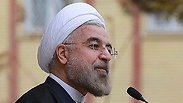

Iran's President Hassan Rohani has defended a nuclear deal with world powers amid continued domestic criticism.
Rohani said on Tuesday that the deal, which promises moderate sanction relief in return for temporarily curbing Iran's nuclear drive, would not be derailed by opposition in government.
Related stories:
- Iranian official reports progress in nuclear talks with powers
- Iran's Rohani eyes rebuilding relations with United States
- Iran says to continue nuclear talks despite US blacklist
"It required brave decision-making ... We should not and do not fear the fuss made by the few people or a small percentage", Rohani said in remarks broadcast live on state television.
"The initial agreement with the six major powers on the nuclear issue was not a simple task but very difficult and complicated," he said.
Rohani's defense came after repeated criticism by opposition in parliament and the powerful Revolutionary Guards of the deal signed in November.
The agreement requires Iran to roll back parts of its nuclear drive for six months, in exchange for modest sanctions relief and a promise by Western powers not to impose new sanctions.
Critics have primarily questioned if the Islamic Republic benefits from the deal, and if fewer concessions could have been made by the negotiating team, led by Mohammad Javad Zarif, Iran's foreign minister.
In recent weeks, elements in the conservative-dominated parliament have sought to form a committee to supervise the negotiating process but to no avail.
However, Rohani appears to enjoy the backing of supreme leader Ayatollah Ali Khamenei, who retains control of all final decisions regarding the matter.
"In all important and sensitive steps along the way, the supreme leader has backed the government and its policies," Rohani said.
Iran's economy has been hard hit by international sanctions, while the vital oil exports have been more than halved by US and European embargoes.
The deal - which is yet to come into force- is aimed at creating a window of diplomatic opportunity for Iran and the P5+1 group of world powers, comprising the US, Britain, France, China and Russia plus Germany, to find a lasting solution to the decade-long standoff over Iran's nuclear activities.
In Tehran, meanwhile, legislators are readying a bill that would oblige the government to enrich uranium to 60% if Iran is hit by new sanctions.
Talks to remove remaining obstacles before the deal is implemented will resume in Geneva, Switzerland, on Thursday.















